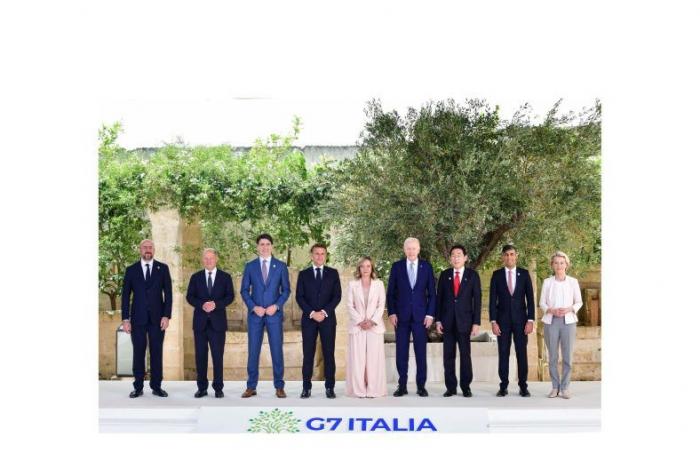(AGENPARL) – Rome, 14 June 2024
China’s state-run newspaper Global Times predicted on Friday that the nations of the Group of 7 (G7), a coalition composed mainly of the United States and European states, will soon lose their relevance due to “internal divisions” that will test their unity. In an article describing the summit.
The G7 summit, currently underway in Italy, has so far focused mainly on responding to Russia’s ongoing invasion of Ukraine, as is expected of an organization dominated by European powers. The White House has repeatedly said that President Joe Biden should also discuss the continuing threat that Communist China poses to the free world, both geopolitically – through support for Russia – and economically.
“This year’s G7 summit has only just begun, and it is the Western media that is the first to seem depressed, with some even giving off a funereal atmosphere about the G7,” the state newspaper said, citing examples of media outlets in the United States and Great Britain
The Politico newspaper he claims
The state newspaper suggested that the reason for the concerns appeared to be disagreements at the conference on several issues, including challenging China’s attempts to flood foreign economies with cheap, slavery-tainted goods to destroy
“Some European countries have very intense trade relations with China and are eager to avoid a trade war,” he said Global Times.
In summary, this year’s G7 summit, according to Chinese coverage, is marked by an atmosphere of pessimism and discord, leaving room for new global players such as the BRICS to take over the international stage.
“This year’s G7 summit has just begun and it is the Western media that is the first to seem depressed, with some even giving off a funereal atmosphere about the G7. Politico says that “this week’s meeting of G7 leaders in Italy looks more like the Last Supper than a demonstration of Western power.” CNN describes the meeting as G7 leaders gather in Italy to “escape domestic political danger” and questions how effective the G7, defined by US President Joe Biden’s aides as the “steering committee of the free world”, can be. amidst the anger. and the discontent of their own populations. “Does the G7 have any power?” When the BBC asks the seemingly calm question, it also shows a sense of helplessness behind it,” reads the Global Times editorial.
“Although the United States is not the host of this G7 summit, so far all the topics exposed by the media have been framed by the United States, which is consistent with the American diplomatic style internationally. Of course, this does not mean that Europe can just nod and passively accept. According to “sources”, the United States is preparing to convince the other G7 leaders to agree to use interest income from the frozen 300 billion euros of the Russian central bank as collateral for a loan to Ukraine, with the EU as the sole guarantor of the loan. This caused anger within the EU. Differences on China-related issues are even more pronounced, with the US making an effort to warn Chinese banks that “support Russia” and seeking to mobilize Europe to form a united front against China’s so-called overcapacity . However, “some European countries have very intense trade relations with China” and “are eager to avoid a trade war,” the GT underlined.
“Washington’s calculations are almost clashing with its allies. Washington aims to maximize its interests through the above-mentioned issues, while also forcing other G7 countries to voluntarily bear risks and sacrifice their national interests to cooperate with it. It is no wonder that, even before the summit was convened, several internal divisions within the G7 were brought to light through various channels. In general, when the United States proposes one thing, Europe rejects another. Although the G7 may ultimately still reach a statement that emphasizes “unity,” Europe’s disappointment and anger towards the United States, ignoring the feelings and interests of these allies, are quite evident,” continues the GT .
“In recent years, the G7 has found ways to increase its visibility and so-called cohesion by highlighting China-related issues. Last year’s joint statement mentioned “China” 20 times, almost exhausting all possible topics of sensationalism. The G7 now seems to be moving towards becoming “1+6”, driven by the US agenda to contain China”, continues the GT.
“However, considering the reactions of various sectors in Europe after the EU tariffs on Chinese goods, it still remains a significant question whether other G7 countries will ignore their own interests in following the US agenda. The G7 is increasingly transformed by Washington into an instrument for the geopolitical interest of the United States, and the “international issues” discussed at the summit are misaligned or opposed to those of the international community,” the GT underlines.
“As the “club of rich nations”, the G7 should have taken on more responsibility for the world, but now it leaves the world only with disappointment. An international charity group has highlighted that with funds equivalent to less than 3% of their combined annual military spending, G7 countries could help end world hunger and resolve the debt crisis in the Global South. However, not only does the G7 fail to provide any beneficial public goods, it continually exports conflicts, confrontations and risks. If his power has now been halved, his contribution to the world should be considered zero or even negative. The New York Times published an article stating that the G7 faces an “undisciplined world,” reflecting a “Western-centric” perspective. From the international community’s point of view, the G7, increasingly driven towards conservatism and blockade policy by the United States, is the side that is truly “out of control”, the GT said.
“Last year’s G7 summit in Hiroshima, Japan, was jokingly referred to by the media as the annual meeting of the ‘lonely hearts club,’ and that description remains apt this year. While international multilateral platforms led by emerging countries thrive, the small circle of the G7 is increasingly closed, with a narrowing path. Today, the G7’s ability to curb international conflicts, support international institutions and enforce international law is weakening by the day. In issues such as the abuse of sanctions and the destabilization of the global financial system, the G7 is now creating new risks and threats against global stability. Between internal conflicts and inconsistent policies, it is already difficult for the G7 countries to find their own direction, let alone establish “rules” for the world, believe they are capable of “leading the world” and position themselves above the other countries. No wonder even the Western media can’t help but sigh, the GT concluded.





